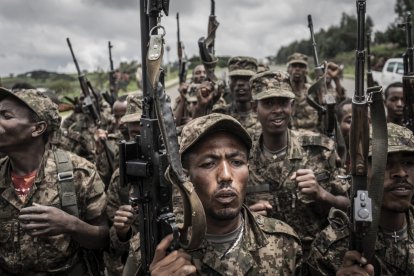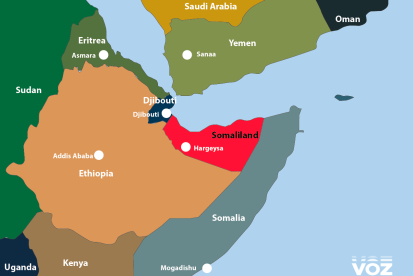Somalia-Ethiopia: The 'silent' war that threatens to unbalance the world
A war between Somalis and Ethiopians would be catastrophic, not only for Africa, as it could involve heavily armed rival nations and various ethnic and religious groups supported by different countries. A journey through the origins and evolution of this complex conflict in an area of great importance to the world.

Soldiers of the Ethiopian Armed Forces.
The Horn of Africa region is on the brink of a war that is barely talked about but could greatly affect not only that area, but the entire world.
In an article published in the New York Times, Somali researchers Afyare A. Elmi and Yusuf Hassan pointed out that the conflict is related to the intention of Abiy Ahmed, prime minister of Ethiopia to grant his country an outlet to the sea.
To this end, the Ethiopian leader signed an agreement with the president of Somaliland, a self-proclaimed republic in Somalia, in early 2024.
The pact reached by the two leaders involves recognizing Somaliland as an independent republic in exchange for Ethiopia obtaining an outlet to the sea by establishing a 12-mile naval base in the Gulf of Aden.
As expected, Somalia rejected the agreement and accused Ethiopia of violating the sovereignty of its territory in order to control it illegally.

Horn of Africa
Somalia's position has been backed by the United States, the European Union, the UN and the African Union. All of them called for respecting the countries' borders and sovereignty.
It should be noted that China has also expressed support for Somalia's territorial integrity.
Tensions have escalated in recent months. The Ethiopian government sent troops into Somalia twice in June and a month later a Somali militia attacked and looted two truckloads of weapons that had been sent by the Ethiopians.
In addition, Somalia reached a defense agreement with Turkey earlier this year and with Egypt last July. However, it should be clarified that the Turks have tried, unsuccessfully, to mediate between the parties, as they are not at odds with either side.
In mid-September, Ahmed stated that anyone planning to invade his country should "think ten times." The warning issued by the Ethiopian prime minister comes amid high tension in East Africa, following the strengthening of military cooperation between the Egyptians and the Somalis.
The Emirati newspaper The National reported that in mid-September that Egypt sent special forces, weaponry and military equipment to Somalia. Cairo also plans to move another 5,000 troops to join the African Union (AU) forces in Somalia later this year, as well as another 5,000 to be deployed independently.
In an article published on the Israeli news portal Davar, researcher Dr.Moshe Tardinan and journalist Uriel Levy claimed that the AU force has been in Somalia since 2007 to help the government in Mogadishu, the country's capital, fight against the jihadists of Al-Shabab, affiliated with Al-Qaeda, who have taken control of a large part of the south of the country.
Regarding the tension between Ethiopia and Egypt, the authors brought up the construction of the Ethiopian 'Renaissance Dam' on the Nile River, which was completed last year. It is the largest hydroelectric dam in Africa and provides about 80% of the Nile water reaching Egypt near its border with Sudan.
The dam is intended to provide electricity to millions of Ethiopians, as 70% of its population of more than 130,000,000 people have no access to electric power, while Egypt's 116,000,000 inhabitants are connected to the national power grid.
The Israeli authors explained that Egypt has repeatedly tried to prevent the construction of the dam, including going to the UN Security Council four times in the past 13 years.
Donald Trump warned four years ago, during his presidency, that Egypt could blow up the dam. Likewise, Cairo also reached out to Israel to help it stop Ethiopia's project through diplomatic channels. However, the negotiations failed and Ethiopia moved forward with the dam and filled it with water.
The role of the U.S. government
Amid tensions, the Biden-Harris administration recently announced that it will provide full annual military aid to Egypt after unfreezing $300,000,000 that had been withheld because of allegations of human rights violations hanging over the Egyptian government.
The U.S. contribution amounts to $1.3 billion.
Tardiman and Levy explained that Washington has distanced itself in recent years from Ethiopia, previously a key regional partner of the Americans, because of the civil war that erupted in the African country in November 2020, a year after Prime Minister Ahmed won the Nobel Peace Prize.
The U.S. government condemned the Ethiopian authorities for the attack by federal forces in the Tigray region and for preventing the delivery of humanitarian aid to towns under siege.
Somalia has also been embroiled in a civil war for decades. The conflict erupted after the fall of dictator Mohammed Siad Barre in 1991, which has generated worldwide concern, but was slowly being put aside after Somaliland in the north of the country gained de facto independence that same year and Islamists took control of large parts of the south.
Ethiopia's other attempts to gain access to the sea
Djibouti has also recently sought to reduce tensions in the region by offering Ethiopia a shared operation of its Tadjoura commercial port, which opened in 2017 on the shores of the Gulf of Aden.
Since Ahmed took over as prime minister in 2018, his government has considered gaining access to the sea via Eritrea, Port Sudan and Kenya's Lamu port. Now he is trying to do so through Somaliland, which has generated this controversy that could spark a fierce war.
The importance of avoiding a war in the region
A war conflict of this caliber would be devastating, since armed rival countries and various ethnic and religious groups would intervene.
It should also be taken into account that both countries are immersed in complex internal conflicts, and in the case of Ethiopia also in its borders with Eritrea and Sudan.
As for the region, already ravaged by the war in Sudan, it would become even more unstable and this conflict could be joined by countries such as Eritrea, Djibouti, Yemen, Egypt, Saudi Arabia and Sudan, which consider the Red Sea essential to their national security.
In addition, Afyare A. Elmi and Yusuf Hassan pointed out that the United States, China and some European nations already have a military presence in the Red Sea, while Turkey, Iran, the United Arab Emirates and Russia have recently entered the fray.
The authors of the New York Times article stated that East Africa is vital to international trade and security, as the Gulf of Aden and the Red Sea connect Asia to Europe and America, while the Horn of Africa is Asia's gateway to the entire African continent.
Also of concern is the possible resurgence of Islamic terrorist organizations in the region, such as Al-Shabaab.
The authors called on the world, especially the United States, to promote dialogue in the region to avoid armed conflict with catastrophic consequences.
RECOMMENDATION





















